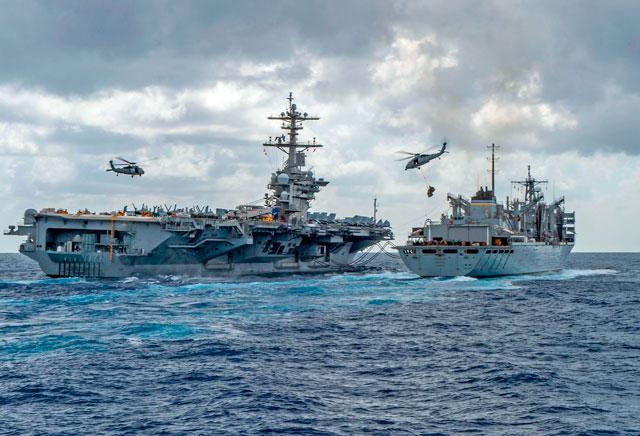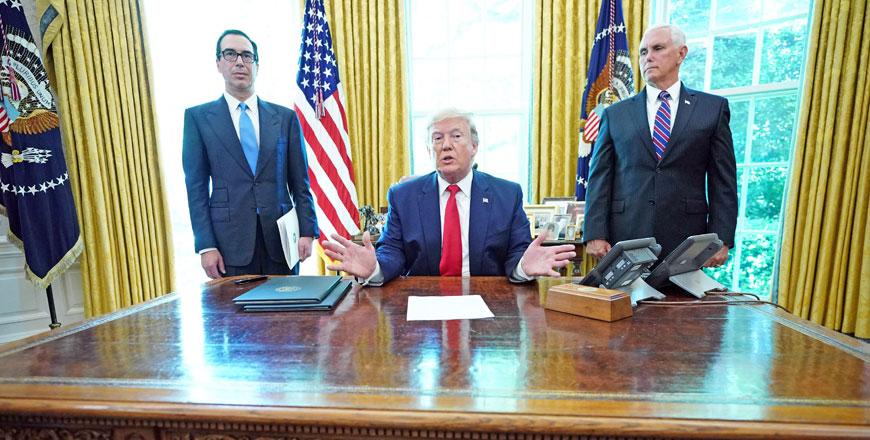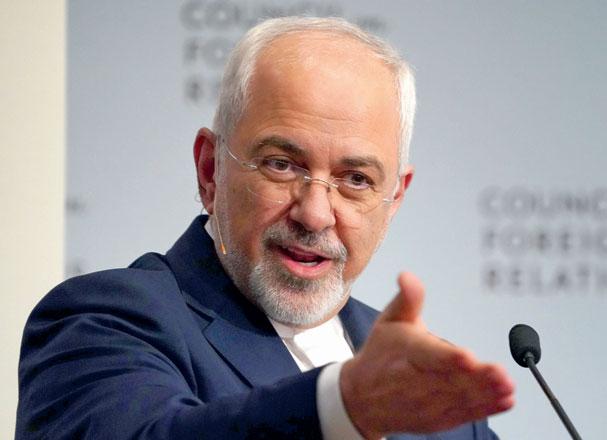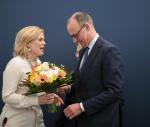You are here
Iran accuses US of 'unacceptable' escalation in tensions
By AFP - May 16,2019 - Last updated at May 16,2019

This handout photo released by the US navy on May 8 shows the Nimitz-class aircraft carrier USS Abraham Lincoln (CVN 72) while conducting a replenishment-at-sea with the fast combat support ship USNS Arctic (T-AOE 9), while MH-60S Sea Hawk helicopters assigned to the 'Nightdippers' of Helicopter Maritime Strike Squadron (HSM) 5, transfer stores between the ships (AFP photo)
TOKYO — Iran accused the United States Thursday of an "unacceptable" escalation of tensions and said Tehran was showing "maximum restraint" despite Washington's withdrawal from a nuclear deal with world powers.
Tensions were already high after President Donald Trump walked away a year ago from the accord, which eased international sanctions in return for curbs on Iran's nuclear programme.
But tensions have ratcheted up, with the US deploying an aircraft carrier group and B-52 bombers to the Gulf over alleged threats from Iran.
"The escalation by the United States is unacceptable," Iranian Foreign Minister Mohammad Javad Zarif said in Tokyo, where he is holding talks with Japanese officials.
"We exercise maximum restraint... in spite of the fact that the United States withdrew from JCPOA last May," Zarif said earlier, referring to the agreement on Tehran's nuclear programme, which is known as the Joint Comprehensive Plan of Action.
He added that Tehran remains "committed" to the deal, and said continuing assessments showed Iran was in compliance with the multilateral agreement.
Later, Zarif told reporters there was "no possibility" of negotiations with the United States to reduce spiralling tensions, describing US pressure as an "act of suicide".
Zarif's comments came after the US on Wednesday ordered non-emergency staff evacuated from its Baghdad embassy due to an alleged "imminent" threat from Iranian-linked Iraqi militias.
Two major pro-Iran armed groups in Iraq rejected suggestions the embassy personnel were at risk.
Nasr Al Shomari, a military commander for the Iran-backed Harakat Al Nujaba, told AFP the claim was "a pretext" by Washington to create "an uproar" in Iraq.
But the move added to growing fears that the long-time rivals could be on course for conflict despite both sides stressing they have no desire for war.
Trump, however, predicted Iran would “soon” want to negotiate.
“I’m sure that Iran will want to talk soon,” the president Tweeted.
He also blasted media reports of White House turmoil over Iran, saying “there is no infighting whatsoever. Different opinions are expressed and I make a final and decisive decision”.
Zarif late on Thursday dismissed Trump’s prediction of talks, telling reporters: “I don’t know why President Trump is confident.”
Opponents of Trump say hardliners led by national security adviser John Bolton, who has long advocated toppling the Iranian government, are pushing the country into war.
According to Iranian state media, Zarif is set to visit China on Friday for discussions on “regional and international issues” including the 2015 nuclear deal with global powers.
‘Imminent threat’
Despite international scepticism, the US government has been pointing to increasing threats from Iran, a long-time enemy and also a rival of US allies Israel and Saudi Arabia.
Senior State Department officials, speaking on condition of anonymity, said the threat came from Iraqi militia “commanded and controlled” by Tehran’s Islamic Revolutionary Guard Corps.
“It is directly linked to Iran, multiple threat streams directly linked to Iran,” said one official.
“This is an imminent threat to our personnel,” said a second official.
Washington says it has received intelligence on possible attacks by Iranian or Iranian-backed forces, possibly targeting US bases in Iraq or Syria.
Iran’s supreme leader, Ayatollah Ali Khamenei, on Tuesday insisted the showdown with the United States was a mere test of resolve.
“This face-off is not military because there is not going to be any war. Neither we nor them [the US] seek war,” he said.
US Secretary of State Mike Pompeo echoed that sentiment, saying in Sochi, Russia: “We fundamentally do not seek a war with Iran.”
World powers have rushed to urge calm and US allies continued to show scepticism over Washington’s alarm bells.
But UK Foreign Secretary Jeremy Hunt said he had recently met with Pompeo and shared “the same assessment of the heightened threat posed by Iran”.
“As always we work closely with the US,” he Tweeted.
Britain’s defence ministry meanwhile said on Wednesday that they have “long been clear about our concerns over Iran’s destabilising behaviour in the region” — while still not confirming any new imminent danger.
Some observers speculate Tehran is seeking to retaliate over Washington’s decision in April to put Iran’s Revolutionary Guards on a terrorism blacklist — a move designed to stymie their activities across the Middle East.
But since the first US warning on May 5, the only incident has been a still-mysterious “attack” on Monday on tankers anchored off Fujairah, an Emirati port located at the strategically-crucial entrance to the Gulf.
One or more vessels incurred light hull damage, but what caused the damage and who was behind it remains unknown.
Related Articles
WASHINGTON — The United States imposed sanctions Monday on Iran's supreme leader Ayatollah Ali Khamenei and a string of military chiefs, tig
TEHRAN — Iran's President Hassan Rouhani on Thursday mocked a US decision to impose sanctions on his top diplomat Mohammad Javad Zarif, sayi
TEHRAN — Iranian Foreign Minister Mohammad Javad Zarif said on Monday the “genocidal taunts” of US President Donald Trump will not “end Iran



















